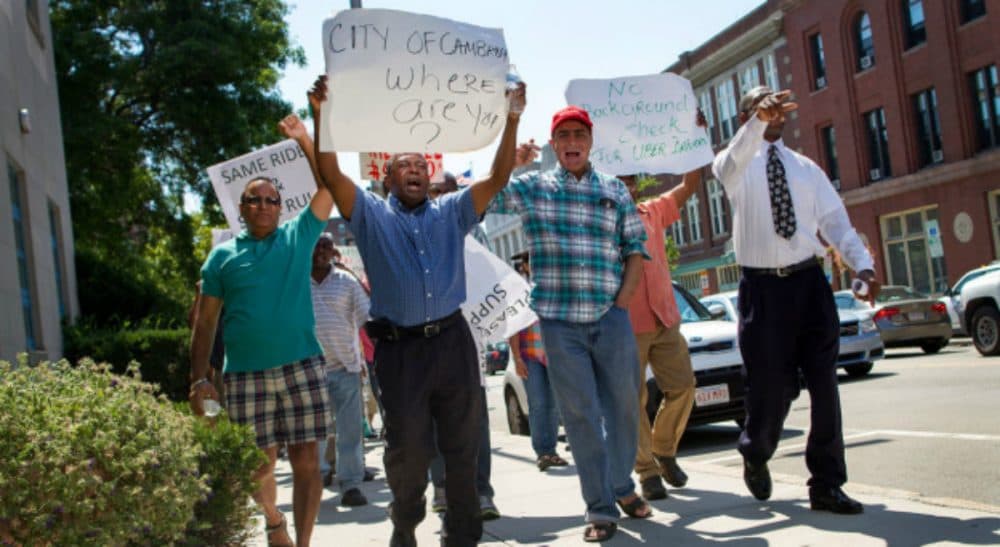Advertisement
Memo To Cambridge Taxi Drivers: Adapt, Or Else Drive Into The Sunset

Beyond the isolated inconvenience and traffic aggravation it caused, the Cambridge taxi driver strike staged earlier this week to protest Uber and Lyft came off as pathetic and a little sad. This wasn’t Paris, where protesting drivers last month locked down the city, blocking roads to airports and train stations, setting fire to cars, and facing teargas-firing riot police. In contrast, the “one-day” strike in front of City Hall barely lasted a half-day, breaking up in time for drivers to catch the rush hour business to Logan or the hotels (these guys have to make a living, after all). Most of those protesting drove for just one of the Cambridge cab companies, and the strike itself was opposed by the state’s largest taxi advocacy group, which is banking on statewide legislation to regulate the ride-sharing services.
It’s not that I don’t feel bad for the drivers... I was one of them. I know how hard they work... But from a customer standpoint, it’s tough to argue against Uber and Lyft.
It’s not that I don’t feel bad for the drivers. I was one of them. I know how hard they work: 12-hour shifts for six, even seven, days a week, crummy pay, no benefits, lost time with families. And all for a job the Labor Department lists as one of the most dangerous occupations in America. I understand their frustration that while they patiently sit parked on a cabstand waiting for a fare, some Uber or Lyft driver can come onto the job for a four-hour stint, poach their work and go home in time to have dinner with his kids.
But from a customer standpoint, it’s tough to argue against Uber and Lyft. They’re more convenient. They’re reliable. The cars are clean (most of the cabs in Cambridge are still beat up old Crown Vics). They show up when you need them. And, most of all, the price is right. Besides, it’s tough to feel bad for the demise of the old taxi medallion system—a legislated monopoly ill-designed to respond to a community’s transportation needs and which benefits a handful of politically connected insiders or those willing to pay the outrageous $500,000 cost for the piece of tin that allows each car to operate as a taxi (down from a pre-Uber high of $660,000). For the drivers, too, the medallion system offered little to cheer for, other than the fact that they didn’t have to drive their own car.
![Tom LeCompte: "[The Cambridge strike] wasn’t Paris, where protesting drivers last month locked down the city, blocking roads to airports and train stations, setting fire to cars, and facing teargas-firing riot police." Pictured: Striking taxi drivers stand behind an overthrown car during a demonstration, Thursday, June 25, 2015 in Paris, France. (Michel Euler/AP)](https://media.wbur.org/wp/2015/08/AP_691684880381.jpg)
For Cambridge taxi drivers, the battle against Uber was lost last year, when the city abandoned an effort to regulate ride-sharing services when supporters of Uber turned out in droves at public hearings to protest against the proposal. On Monday, the best the few city officials who showed up could promise was to include taxi drivers in a “buy local” PR campaign. Ouch!
...it’s tough to feel bad for the demise of the old taxi medallion system—a legislated monopoly ill-designed to respond to a community’s transportation needs.
Raging against the gods of change is part of the human condition. As a refugee from the newspaper industry, I know this. I held on through round after round of layoffs and cutbacks for as long as I could before I realized that my choice was clear: adapt or die. So, like typesetters, telegraph operators, typewriter repairmen and telephone book salesmen before me, I moved on, and turned freelance.
While I never considered cab driving a career, I can see my former colleagues facing the same dilemma. The state may impose some sort of regulation on Uber and the like, but they won’t stop it. They can’t, really. So the drivers most likely to succeed will be those who embrace the changes.
I wish them luck.
